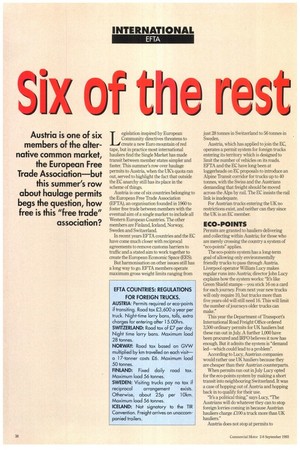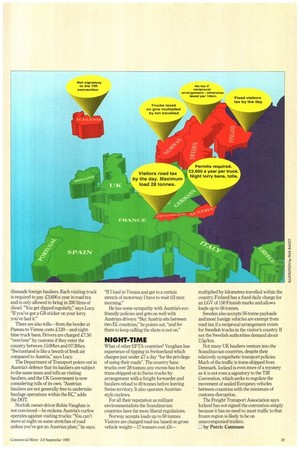Six fit qtr]
Page 42

Page 43

If you've noticed an error in this article please click here to report it so we can fix it.
Austria is one of six members of the alternative common market, the European Free Trade Association—but this summer's row about haulage permits begs the question, how free is this "free trade" association?
Legislation inspired by European Community directives threatens to create a new Euro mountain of red tape, but in practice most international hauliers find the Single Market has made transit between member states simpler and fasten This summer's row over haulage permits to Austria, when the UK's quota ran out, served to highlight the fact that outside the EC anarchy still has its place in the scheme of things.
Austria is one of six countries belonging to the European Free Trade Association (EFTA), an organisation founded in 1960 to foster free trade between members with the eventual aim of a single market to include all Western European Countries. The other members are Finland, Iceland, Norway, Sweden and Switzerland.
In recent years EFTA countries and the EC have come much closer with reciprocal agreements to remove customs barriers to traffic and a stated aim to work together to create the European Economic Space (EES).
But harmonisation on other issues still has along way to go. EFTA members operate maximum gross weight limits ranging from just 28 tonnes in Switzerland to 56 tonnes in Sweden.
Austria, which has applied to join the EC, operates a permit system for foreign trucks entering its territory which is designed to limit the number of vehicles on its roads. EFTA and the EC have long been at loggerheads on EC proposals to introduce an Alpine Transit corridor for trucks up to 40 tonnes, with the Swiss and the Austrians demanding that freight should be moved across the Alps by rail. The EC insists the rail link is inadequate.
For Austrian trucks entering the UK no restrictions exist, and neither can they since the UK is an EC member.
ECO-POINTS
Permits are granted to hauliers delivering and collecting within Austria; for those who are merely crossing the country a system of "eco-points" applies.
The eco-points system has a long-term goal of allowing only environmentally friendly trucks to pass through Austria. Liverpool operator William Lucy makes regular runs into Austria; director John Lucy explains how the system works: "It's like Green Shield stamps—you stick 16 on a card for each journey. From next year new trucks will only require 10, but trucks more than five years old will still need 16. This will limit the number of journeys older trucks can make."
This year the Department of Transport's International Road Freight Office ordered 3,500 ordinary permits for UK hauliers but these ran out in July. A further 1,000 have been procured and WO believes it now has enough. But it admits the system is "demand led—which could lead to a problem".
According to Lucy, Austrian companies would rather use UK hauliers because they are cheaper than their Austrian counterparts.
When permits ran out in July Lucy opted for the eco-points system by making a short transit into neighbouring Switzerland. It was a case of hopping out of Austria and hopping back in to qualify for their use.
"It's a political thing," says Lucy, "The Austrians will do whatever they can to stop foreign lorries coming in because Austrian hauliers charge £100 a truck more than UK hauliers."
Austria does not stop at permits to dissuade foreign hauliers. Each visiting truck is required to pay £3,600 a year in road tax and is only allowed to bring in 200 litres of diesel. "You get dipped regularly," says Lucy. If you've got a GB sticker on your lorry you've had it."
There are also tolls—from the border at Passau to Vienna costs £120—and nighttime truck bans Drivers are charged £7.50 "overtime" by customs if they enter the country between 15:00hrs and 07:30hrs. "Switzerland is like a breath of fresh air compared to Austria," says Lucy.
The Department of Transport points out in Austria's defence that its hauliers are subject to the same taxes and tolls as visiting hauliers, and the UK Government is now considering tolls of its own. 'Austrian hauliers are not generally free to undertake haulage operations within the EC," adds the DOT Norfolk owner-driver Robin Vaughan is not convinced—he reckons Austria's curfew operates against visiting trucks: "You can't move at night on some stretches of road unless you've got an Austrian plate," he says. "If I load in Vienna and get to a certain stretch of motorway I have to wait till next morning" He has some sympathy with Austria's ecofriendly policies and gets on well with Austrian drivers: "But Austria sits between two EC countries," he points out, "and for them to keep calling the shots is not on."
NIGHT-TIME
What of other EFTA countries? Vaughan has experience of tipping in Switzerland which charges just under £7 a day "for the privilege of using their roads". The country bans trucks over 28 tonnes; any excess has to be trans-shipped on to Swiss trucks by arrangement with a freight forwarder and hauliers reload to 40 tonnes before leaving Swiss territory: It also operates Austrianstyle curfews.
For all their reputation as militant environmentalists the Scandinavian countries have far more liberal regulations Norway accepts loads up to 50 tonnes. Visitors are charged road tax based on gross vehicle weight-17-tormers cost £6— multiplied by kilometres travelled within the country. Finland has a fixed daily charge for an WV of 150 Finnish marks and allows loads up to 56 tonnes.
Sweden also accepts 56-tonne payloads and most foreign vehicles are exempt from road tax if a reciprocal arrangement exists for Swedish trucks in the visitor's country. If not the Swedish authorities demand about 2.5p/km.
Not many UK hauliers venture into the Scandinavian countries, despite their relatively sympathetic transport policies. Much of the traffic is trans-shipped from Denmark. Iceland is even more of a mystery as it is not even a signatory to the TIR Convention, which seeks to regulate the movement of sealed European vehicles between countries with the minimum of customs disruption.
The Freight Transport Association says Iceland has not signed the convention simply because it has no need to: most traffic to that frozen region is likely to be on unaccompanied trailers.
E by Patric Cunnane












































































































